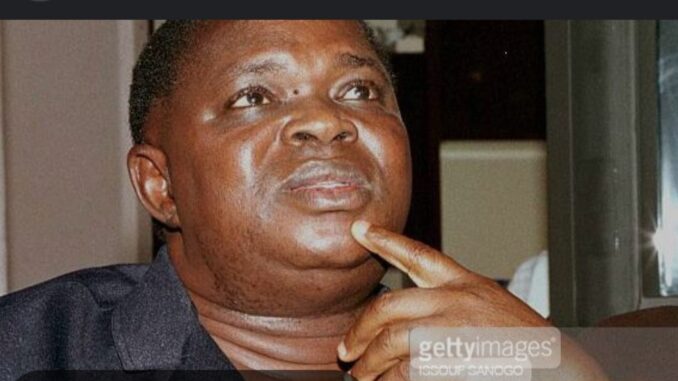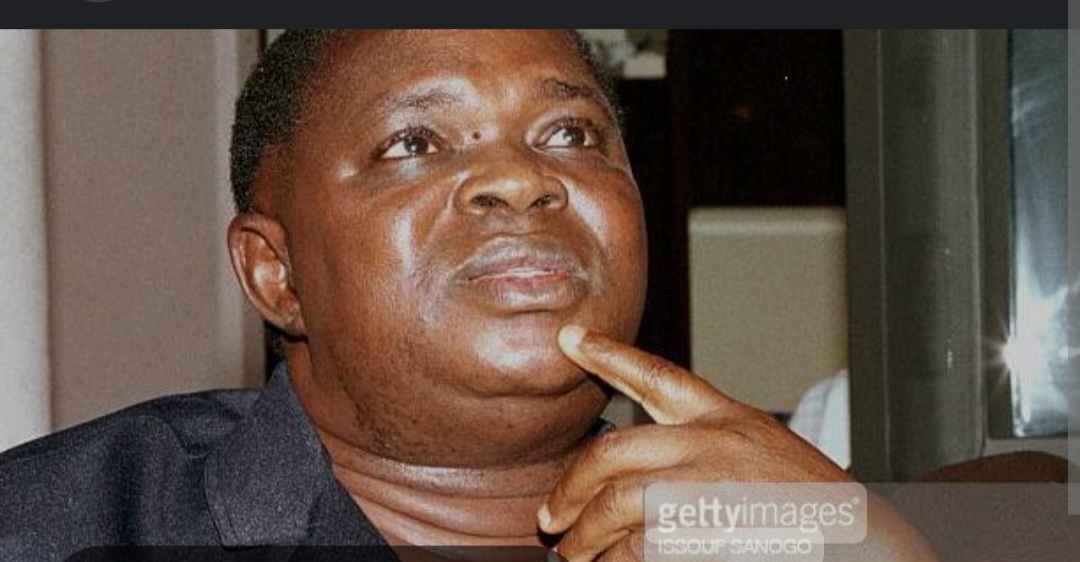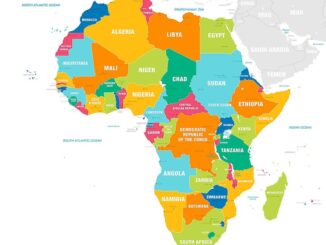
Culled from C4D Newspaper
REFLECTION OF A PRESIDENT: Joseph Saidu Momoh, Leadership and Legacies Part 1
By Marcus Bangura
May 27, 2024
BACKGROUND
Joseph Saidu Momoh (1937-2003) was born in Binkolo, near Makeni, on 26 January 1937 to Limba’s parents. He was a devoted Christian who made several pilgrimages to Israel.
Joseph Saidu Momoh was the Second Executive President of the Republic of Sierra Leone. In 1985, he succeeded President Siaka Stevens by becoming the only candidate in a One-Party referendum flagship of the All-People’s Congress Party (APC). He served as president from November 1985 to April 1992, following his overthrow by the National Provisional Ruling Council (NPRC) on 27 April 1992.
Before he assumed the presidency, Joseph Saidu Momoh was a career soldier. He became the First Major General, Force Commander of the Sierra Leone Army and Minister of Defence.
At independence, very little was known about Joseph Saidu Momoh, even though he was one of the most promising Sierra Leoneans in the army. He was a brilliant and loyal officer, a member of the Old Brigade of real military men whose professionalism was hemmed with discipline and loyalty to the state. Before 1961, Joseph Saidu Momoh served his country in the West African Frontier Force ( WAFF) in the colonial era, where he distinguished himself and quickly rose through the ranks. He will be remembered for his professionalism, commitment and loyalty to the state. These elements, among others, aided him in magnetising Siaka Stevens to recommend him as his successor and become the Second Executive President of Sierra Leone.
Joseph Saidu Momoh grew up in Freetown, where he attended the Government Rural School in Wilberforce and the Methodist Collegiate School Technical Institute in Freetown. After completing his secondary school education, he became passionate about joining the Sierra Leone Army, and in 1958, he joined the West African Frontier Police (WAFP) as a Private Soldier.
In 1962, Joseph Saidu Momoh attended the Nigerian Military Academy in Kaduna, where he commenced courses and won the “Sword of Honour” as best cadet officer. In 1963, he attended the Mons Officer Cadet School in Aldershot, England and was again chosen as best overseas cadet. Upon completing his military training and returning to Sierra Leone in 1963, he was commissioned into the Royal Sierra Leone Military Force as a second lieutenant. He was appointed Commander of the First Battalion in 1969, Deputy Force Commander in 1970, Acting Force Commander in 1971, and Force Commander in 1972. Subsequently, Joseph Saidu Momoh received two awards: The Order of the Rokel (OR) and the Order of the British Empire (OBE).
In 1974, Joseph Saidu Momoh was appointed Cabinet Minister of the Ministry of Defence and a member of Parliament. In 1983, he was promoted to Major General and became the first Sierra Leonean to hold that rank in the military.
In 1985, at 80, Siaka Stevens announced his retirement after 17 years as president of Sierra Leone. He recommended the most senior military officer and loyal Force Commander, Major General Joseph Saidu Momoh, the Minister of Defence and a Nominated Member of Parliament to succeed him. The year 1985 was, therefore, a landmark and a turning point in the country’s political history, as Siaka Stevens’s 17-year rule ended and a new era emerged.
However, Joseph Saidu Momoh was a career soldier with little or no interest in politics. He was viewed as having no political ambitions but loyalty and commitment to the state. His rise to the highest office in the country came firstly from his staunch support and loyalty to Stevens during the political crisis of the 1970s. This is undisputable because Stevens was very concerned about his political survival and consolidation of political power. He saw the army commander as the most suitable and reliable person to entrust with political authority. He saw that person in Joseph Saidu Momoh, who he believed would protect his interest. Secondly, Momoh was the most senior officer in the army and was reliable and disciplined. Thirdly, Momoh was not linked to corruption in the government that had immersed his predecessor.
With this so far, Siaka Stevens had to be smart and swift in ensuring that J.S. Momoh became his successor. This was difficult to do in that he was still in active service in the army. The existing constitution, as provided in sections 29, 30 and 31, disqualified J.S. Momoh from contending for the presidency when he was still in the military. Siaka Stevens did not want any impediment to Momoh succeeding him. He, therefore, used his influence and swayed parliament to amend the relevant sections of the constitution with a resolution. After a heated debate in parliament, the motion was passed to amend the relevant sections. Many saw the move as a means to deprive Sorie Ibrahim Koroma of assuming the presidency, who, by the authority of sections 29, 30 and 31, qualified to succeed President Siaka Stevens.
In August 1985, Joseph Saidu Momoh, through the influence of Siaka Stevens, was nominated and endorsed as Leader and Secretary General of the APC party in a delegate conference. This implies that he was the sole presidential candidate. He was elected unopposed in a popular election. Despite this, J.S. Momoh launched a vigorous campaign for a referendum. The elections were conducted, and of course, he won overwhelmingly. He took the oath of office and assumed the presidency on 28 November 1985.
RESIDENT JOSEPH SAIDU MOMOH AND HIS ‘NEW ORDER’ ADMINISTRATION (1985-1992)
Major General Joseph Saidu Momoh, First Army Commander, Minister of Defence, and Member of Parliament, became president-elect on 28 November 1985 in a colourful ceremony held at the Chambers of Parliament. He was inaugurated on 26 January 1986. Upon his inauguration as President of the Republic of Sierra Leone, President Momoh called his government ‘New Order’.
Upon assuming political office, President Momoh was not oblivious to the enormous problems he had inherited. He, therefore, needed urgent attention and draconian measures to transform the system. In his maiden speech on 28th November 1985, President Momoh expressed his political will to put the country on its right footing and revive the collapsed state.
One of the president’s major aims was to work hard to build on the foundations laid and break new ground for a brighter Sierra Leone. He also aimed at invigorating the economy and making public corporations viable.
Moreover, the president aimed to combat corruption, smuggling, bribery, and mismanagement of state resources, stop tax evasion, and end the hoarding of basic social commodities.
Another aim of President Momoh was to tackle the incessant problems of rice shortage, poor electricity supply, and inadequate transportation.
The president also aimed to reorganize the civil service, review salary structures and ensure prompt payment of salaries and wages to make it more productive.
Lastly, the president desired ‘constructive nationalism’ to prevent foreigners from continuing to exploit the country and its people. He, therefore, called on all foreign companies to identify themselves with his administration’s aims and aspirations and observe and respect its rules and regulations.
Apart from the problems mentioned above, President Momoh had to contend with the attitude of politicians for their lack of commitment to the national course. Joe A.D. Alie, in his book “Sierra Leone since Independence (New Edition, 2012), commented thus:
‘’Years of authoritarian rule and mindless corruption had affected Sierra Leoneans in several ways. The governing contract between the governing class and the citizens had been abrogated; the former had become vampires, wilfully feeding on the citizenry who, in turn, became individualistic, greedy, selfish and apathetic and completely ignored their civic responsibilities. Few people, including the political leadership, were committed to the national cause if there was one.’’
President Momoh inherited a stagnated economy due to growing foreign debts, rampant inflation, budget deficits, currency devaluation, declining exports, unemployment, high rate of bribery and corruption, and mismanagement of resources by political vampires who diverted the national cake to their aggrandizement at the detriment of the country and people. Under his regime, the roof leaks more than ever as the economy continues to decline. The government found it difficult to ameliorate the tense situation. Almost everything was caught on the web. The number of unemployed youth increased alarmingly, and social services, especially health, education and transportation, degenerated, and agriculture declined. All efforts to resuscitate it failed and poverty increased as a household survey in 1989/1990 captured 82% of Sierra Leoneans living in abject poverty. Commercial banks experienced liquidation, which increased hoarding of the currency and essential commodities like rice, petrol and kerosene, despite the economic emergency; civil servants at top positions became corrupt and enriched themselves while teachers dawdle in poverty as the government could not pay teachers and workers. This disappointed Sierra Leone’s end as the President could not turn things around as expected.
To be continued in the next Edition-Part 2





Leave a Reply